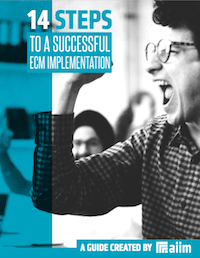The AIIM Blog
Keep your finger on the pulse of Intelligent Information Management with industry news, trends, and best practices.
In 1989, I took my first decision sciences course and started coding in SAS at the age of 20. I greatly enjoyed pulling discoveries buried within mounds of data, although and even small datasets had many discoveries back then. At the root of every model I’ve built, even the simplest, was a solid understanding and foundational rigor of statistical theory. When computing simple statistics or developing descriptive models, I thought through the math behind the model and how this would impact the formation, application, and interpretation.
Share
Big Data | Electronic Records Management (ERM) | Sharepoint and Office 365
Are you finding yourself overwhelmed by the amount of data you have to manage? While it's great to stay up with the latest technology, digital transformation can sometimes leave people feeling like there was a document "explosion" in their department. Not to worry, we're here to help.
Share

Making an ECM implementation successful requires planning and attention to detail. The best way to create the right solution is to identify organizational goals and priorities. Learn how to manage a successful implementation in our free guide.
Data and analytics have redefined the way we compete. Data is a critical corporate asset that organizations are starting to monetize in new ways to get ahead of their competition. The bottom line? Companies that leverage data to drive the performance of their organization’s decisions are winning at a faster rate than their competition.
Share
Analytics | Big Data | Capture and Imaging
Last year, Gartner created quite a stir by retiring the “Big Data” Hype Cycle from its popular “Hype” curve series. According to Betsy Burton at Gartner, “We’ve retired the big data hype cycle. I know some clients may be really surprised by that because the big data hype cycle was a really important one for many years. But what’s happening is that big data has quickly moved over the Peak of Inflated Expectations and has become prevalent in our lives across many hype cycles. So big data has become a part of many hype cycles.”
Share
“Hiding within those mounds of data is knowledge that could change the life of a patient, or change the world.” (Atul Butte, Stanford) "Information is the oil of the 21st century, and analytics is the combustion engine” (Peter Sondergaard, Senior Vice President, Gartner) “War is 90% information.” (Napoleon Bonaparte) "Big Data will spell the death of customer segmentation and force the marketer to understand each customer as an individual within 18 months or risk being left in the dust.” (Ginni Rometty, CEO, IBM) “Without big data analytics, companies are blind and deaf, wandering out onto the web like deer on a freeway.” (Geoffrey Moore, author and consultant) “The world is one big data problem.” (Andrew McAfee) “I keep saying that the sexy job in the next 10 years will be statisticians, and I’m not kidding.” (Hal Varian, chief economist at Google) “The temptation to form premature theories upon insufficient data is the bane of our profession.” (Sherlock Holmes, fictional detective) "The most valuable commodity I know of is information." (Gordon Gekko, Wall Street) "If we have data, let’s look at data. If all we have our opinions, let’s go with mine." (Jim Barksdale, former Netscape CEO) “Processed data is information. Processed information is knowledge, Processed knowledge is Wisdom.” (Ankala V. Subbarao)
Share
We've seen increasing interest and adoption in recognition and routing of inbound content, automated classification of records and email, metadata addition and correction, and all of the improvements in access, security, de-duplication, and retention that flow from this. But content analytics can offer so much more than this, with many applications and uses yet to come, and by 2020 will be one of the primary tools used by any enterprise. Here are eleven facts you might not have known about content analytics, taken from AIIM's latest research - Content Analytics: automating processes, and extracting knowledge. Enjoy!
Share